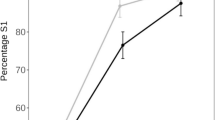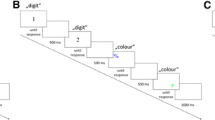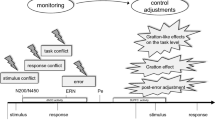Abstract
The conflict monitoring model of cognitive control posits that response conflict triggers a top-down enhancement of a task’s representation in working memory. In the present study, we conducted a novel test of the conflict monitoring model using a voluntary task switching paradigm. We predicted that a task’s representation would be enhanced following events associated with high response conflict (i.e., incongruent trials and incorrect responses), leading participants to voluntarily choose to repeat that task more often after these events than after events associated with low response conflict (i.e., congruent trials and correct responses). In two experiments, performance following incongruent trials was consistent with the conflict monitoring model. However, performance following incorrect trials did not fit with the model’s predictions. These findings provide novel support for the conflict monitoring model while revealing new effects of incorrect trials that the model cannot explain.




Similar content being viewed by others
Notes
In the conflict monitoring model (Botvinick, et al., 2001), errors are linked to a shift along the speed-accuracy tradeoff function that leads participants to respond more slowly and more accurately after making an error than after making a correct response. However, there is no reason why such a shift could not co-occur with an increase in the activation of the current task’s representation in working memory.
The lack of an overall task-repetition bias is unlikely to have resulted from the end-of-block feedback, which indicated the proportion of trials in which a participant had chosen to switch tasks. Indeed, in a different study from our laboratory, we observed a task-repetition bias even when such feedback was given (Orr, Gehring, & Weissman, 2010). However, the lack of an overall task-repetition bias may have resulted from the variable task–key mapping that was employed.
References
Allport, A., Styles, E. A., & Hsieh, S. (1994). Shifting intentional set: Exploring the dynamic control of tasks. In C. Umilta & M. Moscovitch (Eds.), Control of cognitive processes: Attention and performance XV (Vol. 15, pp. 421–452). Cambridge, MA: MIT Press.
Arrington, C. M., & Logan, G. D. (2004). The cost of a voluntary task switch. Psychological Science, 15(9), 610–615. doi:10.1111/j.0956-7976.2004.00728.x.
Arrington, C. M., & Logan, G. D. (2005). Voluntary task switching: Chasing the elusive homunculus. Journal of Experimental Psychology: Learning, Memory, and Cognition, 31(4), 683–702. doi:10.1037/0278-7393.31.4.683.
Arrington, C. M., Weaver, S. M., & Pauker, R. L. (2010). Stimulus-based priming of task choice during voluntary task switching. Journal of Experimental Psychology: Learning, Memory, and Cognition, 36(4), 1060–1067. doi:10.1037/a0019646.
Arrington, C. M., & Yates, M. M. (2009). The role of attentional networks in voluntary task switching. Psychonomic Bulletin & Review, 16(4), 660–665. doi:10.3758/PBR.16.4.660.
Baddeley, A., Emslie, H., Kolodny, J., & Duncan, J. (1998). Random generation and the executive control of working memory. The Quarterly Journal of Experimental Psychology, 51(4), 819–852. doi:10.1080/027249898391413.
Botvinick, M. M. (2007). Conflict monitoring and decision making: Reconciling two perspectives on anterior cingulate function. Cognitive, Affective, & Behavioral Neuroscience, 7(4), 356. doi:10.3758/CABN.7.4.356.
Botvinick, M. M., Braver, T. S., Barch, D. M., Carter, C. S., & Cohen, J. D. (2001). Conflict monitoring and cognitive control. Psychological Review, 108(3), 624–652. doi:10.1037/0033-295X.108.3.624.
Botvinick, M. M., Cohen, J. D., & Carter, C. S. (2004). Conflict monitoring and anterior cingulate cortex: An update. Trends in Cognitive Sciences, 8(12), 539–546. doi:10.1016/j.tics.2004.10.003.
Brown, J. W., Reynolds, J. R., & Braver, T. S. (2007). A computational model of fractionated conflict-control mechanisms in task-switching. Cognitive Psychology, 55(1), 37–85. doi:10.1016/j.cogpsych.2006.09.005.
Burle, B., Possamaï, C.-A., Vidal, F., Bonnet, M., & Hasbroucq, T. (2002). Executive control in the Simon effect: An electromyographic and distributional analysis. Psychological Research, 66(4), 324–336. doi:10.1007/s00426-002-0105-6.
Cho, R. Y., Orr, J. M., Cohen, J. D., & Carter, C. S. (2009). Generalized signaling for control: Evidence from postconflict and posterror performance adjustments. Journal of Experimental Psychology: Human Perception and Performance, 35(4), 1161–1177. doi:10.1037/a0014491.
Cohen, J., & Cohen, P. (1983). Applied multiple regression/correlation analysis for the behavioral sciences. Hillsdale, NJ: L. Erlbaum Associates.
Demanet, J., Liefooghe, B., Verbruggen, F., & Vandierendonck, A. (2010). Voluntary task switching under load: Contribution of top-down and bottom-up factors in goal-directed behavior. Psychonomic Bulletin & Review, 17(3), 387–393. doi:10.3758/PBR.17.3.387.
Egner, T. (2008). Multiple conflict-driven control mechanisms in the human brain. Trends in Cognitive Sciences, 12(10), 374–380. doi:10.1016/j.tics.2008.07.001.
Goschke, T. (2000). Intentional reconfiguration and involuntary persistence in task set switching. In S. Monsell & J. Driver (Eds.), Control of cognitive processes: Attention and performance XVIII (pp. 331–355). Cambridge, MA: MIT Press.
Gratton, G., Coles, M., & Donchin, E. (1992). Optimizing the use of information: Strategic control of activation of responses. Journal of Experimental Psychology: General, 121, 480–506. doi:10.1037/0096-3445.121.4.480.
Henik, A., & Tzelgov, J. (1982). Is three greater than five: The relation between physical and semantic size in comparison tasks. Memory & Cognition, 10(4), 389–395.
Hochman, E., & Meiran, N. (2005). Central interference in error processing. Memory & Cognition, 33(4), 635.
Hommel, B. (1998). Event files: Evidence for automatic integration of stimulus–response episodes. Visual Cognition, 5(1), 183–216. doi:10.1080/713756773.
Hommel, B. (2007). Feature integration across perception and action: Event files affect response choice. Psychological Research, 71(1), 42–63. doi:10.1007/s00426-005-0035-1.
Hommel, B., Proctor, R. W., & Vu, K. P. L. (2004). A feature-integration account of sequential effects in the Simon task. Psychological Research, 68(1), 1–17. doi:10.1007/s00426-003-0132-y.
Jentzsch, I., & Dudschig, C. (2009). Why do we slow down after an error? Mechanisms underlying the effects of posterror slowing. The Quarterly Journal of Experimental Psychology, 62(2), 209–218. doi:10.1080/17470210802240655.
Kerns, J. G., Cohen, J. D., MacDonald, A. W., 3rd, Cho, R. Y., Stenger, V. A., & Carter, C. S. (2004). Anterior cingulate conflict monitoring and adjustments in control. Science, 303(5660), 1023–1026. doi:10.1126/science.1089910.
Laming, D. R. J. (1968). Information theory of choice-reaction times. New York: Academic Press.
Lien, M.-C., & Ruthruff, E. (2008). Inhibition of task set: Converging evidence from task choice in the voluntary task-switching paradigm. Psychonomic Bulletin & Review, 15(6), 1111–1116. doi:10.3758/pbr.15.6.1111.
Logan, G. D., & Gordon, R. D. (2001). Executive control of visual attention in dual-task situations. Psychological Review, 108(2), 393–434. doi:10.1037/0033-295x.108.2.393.
Mayr, U., Awh, E., & Laurey, P. (2003). Conflict adaptation effects in the absence of executive control. Nature Neuroscience, 6(5), 450–452. doi:10.1038/nn1051.
Mayr, U., & Bell, T. (2006). On how to be unpredictable: Evidence from the voluntary task-switching paradigm. Psychological Science, 17(9), 774–780. doi:10.1111/j.1467-9280.2006.01781.x.
Mayr, U., & Keele, S. W. (2000). Changing internal constraints on action: The role of backward inhibition. Journal of Experimental Psychology: General, 129(1), 4–26. doi:10.1037/0096-3445.129.1.4.
McGuire, J. T., & Botvinick, M. M. (2010). Prefrontal cortex, cognitive control, and the registration of decision costs. Proceedings of the National Academy of Sciences, 107(17), 7922. doi:10.1073/pnas.0910662107.
Meiran, N. (1996). Reconfiguration of processing mode prior to task performance. Journal of Experimental Psychology: Learning, Memory, and Cognition, 22(6), 1423–1442. doi:10.1037/0278-7393.22.6.1423.
Notebaert, W., Gevers, W., Verbruggen, F., & Liefooghe, B. (2006). Top-down and bottom-up sequential modulations of congruency effects. Psychonomic Bulletin & Review, 13(1), 112–117.
Notebaert, W., & Verguts, T. (2007). Dissociating conflict adaptation from feature integration: A multiple regression approach. Journal of Experimental Psychology: Human Perception and Performance, 33(5), 1256–1260. doi:10.1037/0096-1523.33.5.1256.
Notebaert, W., & Verguts, T. (2008). Cognitive control acts locally. Cognition, 106(2), 1071–1080. doi:10.1016/j.cognition.2007.04.011.
Orr, J. M., Gehring, W. J., & Weissman, D. H. (2010). ERP predictors of voluntary task switching. Paper presented at the Society for Neuroscience, San Diego, CA.
Rabbitt, P. M. A. (1966). Errors and error correction in choice-response tasks. Journal of Experimental Psychology, 71(2), 264–272. doi:10.1037/h0022853.
Ridderinkhof, K. R. (2002). Micro- and macro-adjustments of task set: Activation and suppression in conflict tasks. Psychological Research, 66(4), 312–323. doi:10.1007/s00426-002-0104-7.
Ridderinkhof, K. R., Ullsperger, M., Crone, E. A., & Nieuwenhuis, S. (2004). The role of the medial frontal cortex in cognitive control. Science, 306(5695), 443–447. doi:10.1126/science.1100301.
Rogers, R. D., & Monsell, S. (1995). Costs of a predictable switch between simple cognitive tasks. Journal of Experimental Psychology: General, 124(2), 207–231. doi:10.1037/0096-3445.124.2.207.
Rubinstein, J. S., Meyer, D. E., & Evans, J. E. (2001). Executive control of cognitive processes in task switching. Journal of Experimental Psychology: Human Perception and Performance, 27(4), 763–797. doi:10.1037/0096-1523.27.4.763.
Ullsperger, M., Bylsma, L. M., & Botvinick, M. M. (2005). The conflict adaptation effect: It’s not just priming. Cognitive, Affective, & Behavioral Neuroscience, 5(4), 467. doi:10.3758/CABN.5.4.467.
Yeung, N., Botvinick, M. M., & Cohen, J. D. (2004). The neural basis of error detection: Conflict monitoring and the error-related negativity. Psychological Review, 111(4), 931–959. doi:10.1037/0033-295X.111.4.931.
Acknowledgments
The authors thank Wendelin Diab and Craig Salm for their assistance with running participants, and Raymond Y. Cho, Catherine M. Arrington, and one anonymous reviewer for helpful comments on earlier versions of the manuscript. This research was supported by a Rackham Graduate Student Research Grant and Psychology Dissertation Grant to JMO and by startup funds from the University of Michigan to DHW.
Author information
Authors and Affiliations
Corresponding author
Rights and permissions
About this article
Cite this article
Orr, J.M., Carp, J. & Weissman, D.H. The influence of response conflict on voluntary task switching: a novel test of the conflict monitoring model. Psychological Research 76, 60–73 (2012). https://doi.org/10.1007/s00426-011-0324-9
Received:
Accepted:
Published:
Issue Date:
DOI: https://doi.org/10.1007/s00426-011-0324-9




